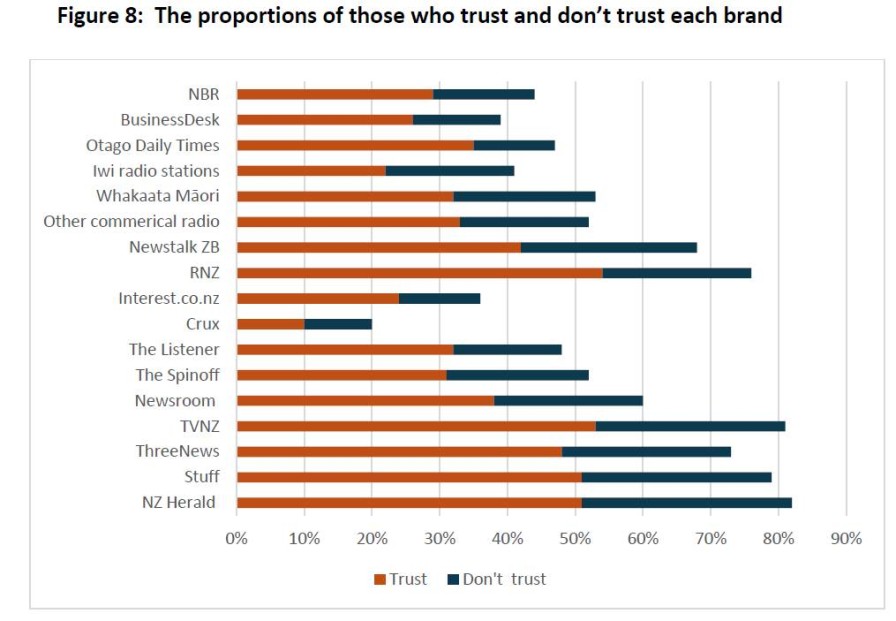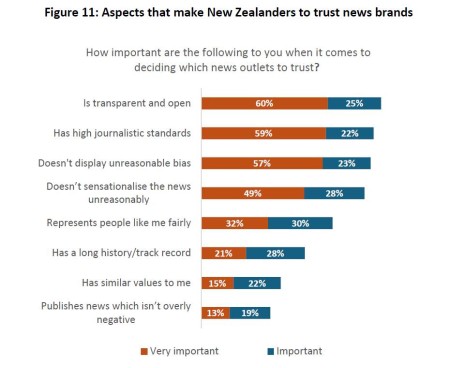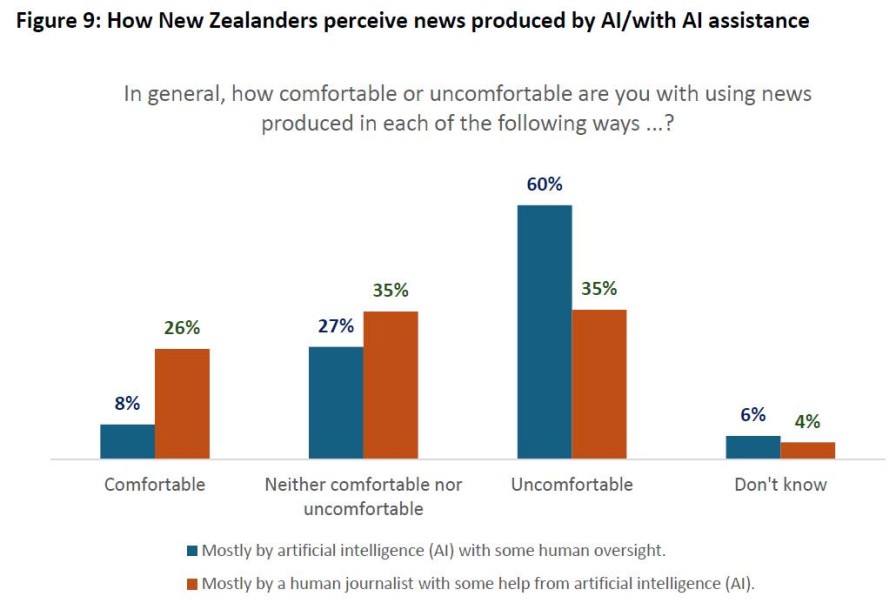NBR named NZ’s most trusted business newsroom
An annual media trust barometer lays out which publications are most trusted, why trust has declined, and what people are most concerned about.
An annual media trust barometer lays out which publications are most trusted, why trust has declined, and what people are most concerned about.
The National Business Review is New Zealand’s most trusted business news publication, and the third-equal most trusted media outlet in the country overall.
The AUT research centre for Journalism, Media and Democracy’s (Jmad) sixth annual Trust in News report, out today, shows RNZ was perceived as the most trusted news brand, the Otago Daily Times was rated as second, and NBR and TVNZ received the third highest trust scores.
The newcomer in the survey, the New Zealand Listener, ranked fourth-equal along with Stuff, Newsroom, BusinessDesk, the New Zealand Herald, ThreeNews, and interest.co.nz. Most improved over the year were the trust scores for Whakaata Māori, RNZ, Iwi Radio, and The Spinoff.
This compares with last year, when the Otago Daily Times was perceived as the most trusted brand, followed by NBR and RNZ at second-equal, and TVNZ, Newsroom, other commercial radio stations and BusinessDesk jointly ranked as the third-most trusted brands.
Comparing the proportions of those who say they trust or mistrust each brand, the Jmad report – by AUT’s Dr Merja Myllylahti and Dr Greg Treadwell – found that, for almost every brand, those who trust it outnumber those who distrust it. For example, 51% of those surveyed said they trust the NZ Herald, compared with 31% who said they didn’t trust the brand. The only exception was Southern Lakes regional publication Crux, which had equal numbers of trusters and mistrusters.

Last year was a ‘perfect storm’ in New Zealand media, with media companies – including Warner Bros Discovery, TVNZ, Stuff, MediaWorks, and The Spinoff – together cutting hundreds of newsroom jobs, the report noted. In early 2025, these cuts continued, as NZME announced in January it would cut 40 roles from the NZ Herald, BusinessDesk, and Newstalk ZB.

At the same time, New Zealanders’ trust in news and journalism declined further, the report showed. About 32% of New Zealanders said they trust “most of the news most of the time”, a one percentage point drop from the 2024 level of 33%. This was a smaller decline than the year before, when trust in news in general fell significantly from 42% in 2023 to 33%.
General trust in news in New Zealand in 2025, at 32%, was substantially lower than the 2024 Reuters Digital News Report’s international average of 47 countries, of 40%. New Zealand trust was at the same level as in the United States. To compare, trust in news was highest in Finland (69%) and lowest in Greece and Hungary (both 23%).
While the trust in New Zealand news showed signs of stabilising in 2025, the level of public trust in news was still substantially lower than before the Covid period.
In 2025, trust in news people consume themselves – rather than their view of news in general – remained at the same level as in 2024, at 45%.
To better understand aspects of news trust, the Jmad research introduced some new questions this year, including asking New Zealanders what aspects were important for them in terms of trusting a specific news brand. About 85% of people said they trusted a news brand that was transparent and open; 81% trusted a news outlet that had high journalistic standards; and 80% trusted a brand that was not “unreasonably biased”.
New Zealanders were asked to what extent they were concerned about poor journalism, defined as making factual mistakes, dumbed-down stories, and misleading headlines/clickbait. A high number, 93% (up one percentage point [pp]) of respondents were at least ‘somewhat concerned’ about poor journalism and 69% were ‘extremely’ or ‘very’ concerned. Those who had high concerns were either 35-54 years old (46%) or 55+ years old (48%).
There was also an increase in respondents who were extremely concerned about the use of the term ‘fake news’. About 59% of respondents were ‘very’ or ‘extremely’ concerned by the use of the term ‘fake news’, up from 56% in 2024.
There was a significant increase among those who are concerned about stories that are completely made up for political or commercial reasons that look like news stories but turn out to be advertisements, with 49% of respondents ‘extremely concerned’, a large jump from 35% in 2024. (NBR does not run advertisements.)
The public is concerned about the use of artificial intelligence in news gathering and production. Asked whether they were comfortable using news mostly produced by AI but with some human oversight, 60% said they were uncomfortable and only 8% were comfortable with this. When asked how comfortable people were with news that’s produced mainly by human journalists with AI assistance, 26% of people were comfortable and 35% uncomfortable. (NBR does not use AI to write or produce its news.)

The public’s interest in the news is declining, along with the number of people actively avoiding the news. In 2025, interest in the news in New Zealand fell 3pp, with 69% now interested or extremely interested in news, compared with 72% in 2024. About 34% of respondents said they were worn out by the news, with 39% of females expressing weariness, and the number of people actively avoiding the news fell 2pp from 75% in 2024 to 73% in 2025.
Reasons people are avoiding the news include feeling overwhelmed and needing to disengage from it for their mental health, perceptions of bias and spin, sensationalism and clickbait, and blurred lines between fact and opinion (NBR does not run opinion.)
News avoidance in New Zealand is much higher than in comparable overseas markets, with the Reuters international average for news avoidance at 39%. However, interest in news is higher in Aotearoa New Zealand than in comparable markets, and people in other markets are more worn out by the news than New Zealanders.
The Jmad report found New Zealanders are most interested in local news (72%), international news (70%), and political news (62%), and are least interested in celebrity and entertainment news (21%) and fun news (26%). Business news sat at 36%.
When asked what sources of news and how frequently they used each brand, 66% of respondents used Stuff as a source of news once or more times per week, 62% used TVNZ, and 60% the NZ Herald as a news source. These were followed by RNZ (42%), other commercial radio stations (39%), ThreeNews (35%), and Newsroom (34%).
In 2025, 27% of New Zealanders had paid for a digital subscription or digital/print bundle to access online news content. About 49% of New Zealanders had not paid for any news services in the past year.
Others had given publications some financial support, such as a one-off donation. About 22% of respondents said they had supported the NZ Herald financially, but support for other news brands was significantly lower. Roughly 9% had supported Stuff, 6% had supported The Spinoff, 6% The Post, 6% the Otago Daily Times, 5% The Press, and 4% Newsroom. Most respondents – 59% – said they had not supported any of the news brands in the survey, while 10% had supported ‘other’ publications.